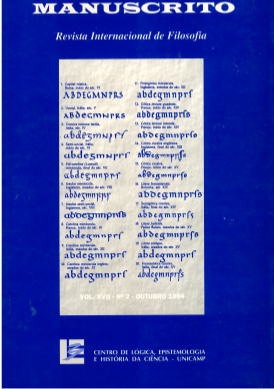Resumo
Neste artigo procuro mostrar que a tese da idealidade do espaço e do tempo constitui-se na característica distintiva do idealismo transcendental de Kant. Sem essa tese, a filosofia teórica kantiana perde todo o seu fundamento. Assim sendo, eu me oponho ao ponto de vista de Strawson de que a tese da aprioridade não implica - e não pode implicar - a tese da idealidade. Ao mesmo tempo, defendo que a idéia kantiana de que espaço e tempo são formas subjetivas da intuição sensível é a posição mais adequada em Filosofia para se caracterizar o espaço e o tempo. Com base nisso, eu analiso o argumento de McTaggart de que o tempo não é real. Eu mostro que, por não dispor da tese da idealidade, McTaggart baseia seu argumento na assunção de uma realidade constituída independentemente de nossos recursos epistêmicos. Eu proponho que a solução ao enigma de McTaggart consiste na inserção da tese kantiana da idealidade em seu argumento.
Referências
Allison, H. (1983). Kant's Transcendental Idealism. (New Haven, Yale University Press).
Erdmann, B. (1878). Kants Kriticismus in der ersten und in der zweiten Auflage der Kritik der reinen Vernunft (Leipzig,Leopold Voss).
Fisk, M. (1971). A Pragmatic Account of Tenses. American Philosophical Quartely, v. 8, n.1, pp. 93-98.
Gale, R.M. (ed.) (1968). The Philosophy of Time. (New Jersey, Humanities Press).
Goodman, N. (1951). The Structure of Appearance. (Cambridge MA, M.I.T. Press).
Guyer, P. (ed.) (1992). The Cambridge Companion to Kant. (Cambridge, Cambridge University Press).
Kant, I. (1990). Critique of Pure Reason. (London, Macmillan). (Translated by N.K. Smith and abbreviated A for the first edition and B for the second edition).
Kant, I. (1902). Kants Gesammelte Schriften. (Berlin, Ed. Preussischen Akademie der Wissenschaften zu Berlin), 29 vols. (abbreviated Ak.).
Kant, I. (1977). Prolegomena. (Indianapolis, Hackett). (Translated by Sir James Ellington). Quotations are abbreviated Prol. and given the pages of the Akademie Editon.
Kant, I. (1900). Dreams of a Spirit-Seer. (London, Macmillan). (Abbreviated Dreams).
Kitcher, P. (1990). Kant's Transcendental Psychology. (Oxford, Clarendon Press).
Mctaggart, J.M.E. (1927). The Nature of Existence. (Cambridge, Cambridge University Press), vol. 2.
Mctaggart, J.M.E (1968). Time, in Gale 1968, pp. 86-97.
Melnick, A. (1973). Kant's Analogies of Experience. (Chicago, University of Chicago Press).
Prauss, G. (1974). Kant und das Problem der Dinge an sich.(Bonn, Bouvier).
Prichard, H.A. (1909). Kant's Theory of Knowledge. (Oxford, Clarendon Press).
Russell, B. (1980). An Inquiry into Meaning and Truth. (London, George Allen and Unwin).
Schwyzer, H. (1990). The Unity of Understanding. (Oxford, Clarendon Press).
Smart, J.J.C. (1963). Philosophy and Scientific Realism. (London, Routledge and Kegan Paul).
Strawson, P.F. (1966). The Bounds of Sense. (London, Methuen).
Vaihinger, H. (1881). Commentar zu Kants Kritik der reinen Vernunft. (Stuttgart, W. Spemann), 2 vols.
Valberg, J. (1992). The Puzzle of Experience. (Oxford, Clarendon Press).
Walsh, W.H. (1975). Kant's Criticism of Metaphysics. (Chicago, University of Chicago Press).
Waxman, W. (1992). Time and Change in Kant and McTaggart. Graduate Faculty Philosophy Journal, v. 16, n. 1.

Este trabalho está licenciado sob uma licença Creative Commons Attribution 4.0 International License.
Copyright (c) 1994 Manuscrito: Revista Internacional de Filosofia

